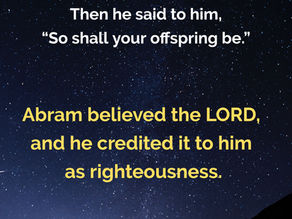1 Corinthians 3:1-9 - Equal Co-workers
- Chad Werkhoven
- Oct 16, 2024
- 4 min read
Stand firm in your faith, but work as equals with Christians who disagree.
1 Corinthians 3:1-9 (NIV)
2:16 ...But we have the mind of Christ.
3 Brothers and sisters, I could not address you as people who live by the Spirit but as people who are still worldly—mere infants in Christ. 2 I gave you milk, not solid food, for you were not yet ready for it. Indeed, you are still not ready. 3 You are still worldly. For since there is jealousy and quarreling among you, are you not worldly? Are you not acting like mere humans? 4 For when one says, “I follow Paul,” and another, “I follow Apollos,” are you not mere human beings?
5 What, after all, is Apollos? And what is Paul? Only servants, through whom you came to believe—as the Lord has assigned to each his task. 6 I planted the seed, Apollos watered it, but God has been making it grow. 7 So neither the one who plants nor the one who waters is anything, but only God, who makes things grow. 8 The one who plants and the one who waters have one purpose, and they will each be rewarded according to their own labor. 9 For we are co-workers in God’s service; you are God’s field, God’s building.
Listen to passage & devotional:
Belgic Confession of Faith, Article 31: The Officers of the Church
We believe that
ministers of the Word of God, elders, and deacons
ought to be chosen to their offices
by a legitimate election of the church,
with prayer in the name of the Lord,
and in good order,
as the Word of God teaches.
So everyone must be careful
not to push one’s self forward improperly,
but all must wait until called by God,
so that they may be assured of their calling
and be certain and sure that it is
from the Lord.
As for the ministers of the Word,
they all have the same power and authority,
no matter where they may be,
since they are all servants of Jesus Christ,
the only universal bishop,
and the only head of the church.
Moreover,
to keep God’s holy order
from being violated or despised,
we say that everyone ought,
as much as possible,
to hold the ministers of the Word and elders of the church
in special esteem,
because of the work they do,
and be at peace with them,
without grumbling, quarreling, or fighting
Summary
Once again we turn our attention to that hapless Corinthian church, not just to gawk at their ineptness & immaturity as Paul exposes it, but because in them we see such a pure reflection of ourselves. We're grateful for these epistles (letters) that Paul sent them, because if we were unable to read these corrections, we would certainly make the same mistakes the Corinthians did.
Paul doesn't mince words, calling them mere infants who can't handle solid food. He's not trying to insult them, rather reminding them (and us) that as people who've been given the mind of Christ, our Father has high expectations for us. A little child can't make himself grow - God works that miracle - but at the same time, a child who doesn't let go of childish toys and food won't grow in the way God intends. So it is with the Church; God miraculously grants the growth, but we must let go of childish ways and step into that growth.
One of the Corinthians' hangups was the tribalism they'd fallen into. Some were in the Apollos' tribe, while others considered themselves 'Paulists.' But Paul reminded them that both he and Apollos (an early evangelist we know little about) had equal status as ministers of the Word.
Although they each had different tasks - Paul planted the seed and Apollos watered it - they both were nothing more that servants of the one and only head of the Church. Paul writes, we are co-workers in God’s service; you are God’s field, God’s building.
Dig Deeper
When our confession was written nearly five centuries ago, the line we're focusing on today was written as a polemic (argument) against the hierarchical structure of the Roman Catholic Church. The Pope, of course, was at the top, and under him were cardinals, archbishops, bishops, and finally priests. This system is still practiced in churches that have an episcopal style of church polity (governance).
But the Reformers were not advocating for a system in which each individual minister could do and teach as he pleased, since other ministers were simply equal co-workers and servants who had no authority over one another. Reformed churches organized into a presbyterian polity in which each congregation and its officers (ministers, elders & deacons) placed themselves in mutual submission to other congregations governed by a church order.
For most of us, this is all interesting trivia, but may not be a top shelf issue in your daily life. But today's passage still has relevance, since the tribalism the Corinthians fell victim to is very much alive and well in our own day and age. Some Christians are Calvinists, and others Wesleyan. Some defend the faith from a presuppositional standpoint, while others favor an evidentialist approach. Some are conservative Republicans, while others are liberal Democrats.
These distinctions are slightly different than what Paul addressed, since there are real and important distinctives between these positions. It's not wrong to stand for Biblical truth alongside like minded people in all of life's various spheres, but your ultimate identity must be that of a co-worker in God's service.
ACKNOWLEDGE WHO GOD IS: Our Father, who makes all things - especially His Church - grow;
ALIGN YOUR LIFE WITH GOD'S WILL: Pray that you will be able hold to important distinctives even as you consider yourself a co-worker in God's service with those who view things differently;
ASK GOD FOR WHAT YOU NEED:
Read the New Testament in a year! Today: John 3




















Comments